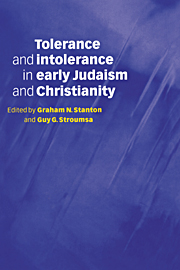Book contents
- Frontmatter
- Contents
- List of contributors
- List of abbreviations
- Introduction
- 1 Intolerance and martyrdom: from Socrates to Rabbi ‘Aqiva
- 2 The other in 1 and 2 Maccabees
- 3 The pursuit of the millennium in early Judaism
- 4 Conservative revolution? The intolerant innovations of Qumran
- 5 Who was considered an apostate in the Jewish Diaspora?
- 6 Why did Paul persecute the church?
- 7 Paul and the limits of tolerance
- 8 Philo's views on paganism
- 9 Coexisting with the enemy: Jews and pagans in the Mishnah
- 10 Tertullian on idolatry and the limits of tolerance
- 11 The threefold Christian anti-Judaism
- 12 The intertextual polemic of the Markan vineyard parable
- 13 Jews and Jewish Christians in the land of Israel at the time of the Bar Kochba war, with special reference to the Apocalypse of Peter
- 14 The Nazoreans: living at the boundary of Judaism and Christianity
- 15 Justin Martyr's Dialogue with Trypho: group boundaries, ‘proselytes’ and ‘God-fearers’
- 16 Accusations of Jewish persecution in early Christian sources, with particular reference to Justin Martyr and the Martyrdom of Polycarp
- 17 Early Christians on synagogue prayer and imprecation
- 18 Messianism, Torah and early Christian tradition
- 19 Jewish and Christian public ethics in the early Roman Empire
- Postscript: the future of intolerance
- General bibliography
- Index
17 - Early Christians on synagogue prayer and imprecation
Published online by Cambridge University Press: 08 March 2010
- Frontmatter
- Contents
- List of contributors
- List of abbreviations
- Introduction
- 1 Intolerance and martyrdom: from Socrates to Rabbi ‘Aqiva
- 2 The other in 1 and 2 Maccabees
- 3 The pursuit of the millennium in early Judaism
- 4 Conservative revolution? The intolerant innovations of Qumran
- 5 Who was considered an apostate in the Jewish Diaspora?
- 6 Why did Paul persecute the church?
- 7 Paul and the limits of tolerance
- 8 Philo's views on paganism
- 9 Coexisting with the enemy: Jews and pagans in the Mishnah
- 10 Tertullian on idolatry and the limits of tolerance
- 11 The threefold Christian anti-Judaism
- 12 The intertextual polemic of the Markan vineyard parable
- 13 Jews and Jewish Christians in the land of Israel at the time of the Bar Kochba war, with special reference to the Apocalypse of Peter
- 14 The Nazoreans: living at the boundary of Judaism and Christianity
- 15 Justin Martyr's Dialogue with Trypho: group boundaries, ‘proselytes’ and ‘God-fearers’
- 16 Accusations of Jewish persecution in early Christian sources, with particular reference to Justin Martyr and the Martyrdom of Polycarp
- 17 Early Christians on synagogue prayer and imprecation
- 18 Messianism, Torah and early Christian tradition
- 19 Jewish and Christian public ethics in the early Roman Empire
- Postscript: the future of intolerance
- General bibliography
- Index
Summary
The synagogue was tolerated under Christian rule in antiquity and the Middle Ages, but much New Testament and patristic authority, including some texts reviewed below, would have weighed on the side of restriction. Early Christian comment on contemporary Jewish worship had intertwined roots in inner-Jewish controversy and in Greek and Roman anti-Jewish polemic.
Yet such comment, despite its polemical character, included some genuine observation. This aspect is illustrated here with two aims in view. First, evidence on Jewish worship in the ancient world is patchy, whether Jewish or non-Jewish. Christian texts are therefore potentially important to the historian of the ancient synagogue, as S. J. D. Cohen has emphasized. Here some passages are reconsidered which may throw light on the rise of the synagogue and the development of Jewish prayer, including the question of anti-Christian imprecations in the synagogue. Secondly, the potentially misleading character of the image of Judaism in Christian polemic has long been noted. Assessment of the Christian sources should also reckon, however, with the keen if hostile observation which they sometimes reflect.
In modern liturgical study, it has often been assumed that Christians knew a good deal about Jewish worship – enough to be deeply influenced by it in their own prayers, down to the relatively late date of the Apostolic Constitutions. A strong support for this view is the dismay expressed by a series of Church Fathers at synagogue attendance by Christians; the witnesses include Origen, Aphrahat, Chrysostom and Jerome.
- Type
- Chapter
- Information
- Tolerance and Intolerance in Early Judaism and Christianity , pp. 296 - 317Publisher: Cambridge University PressPrint publication year: 1998
- 36
- Cited by



